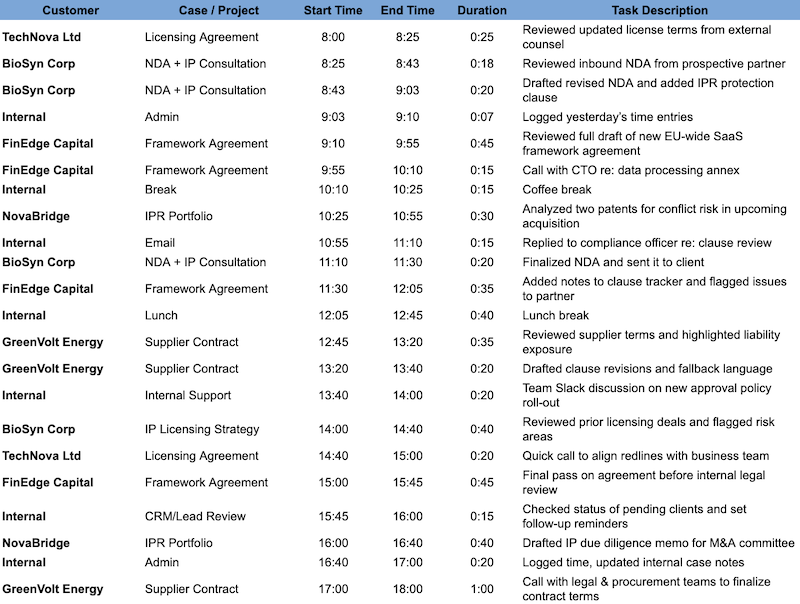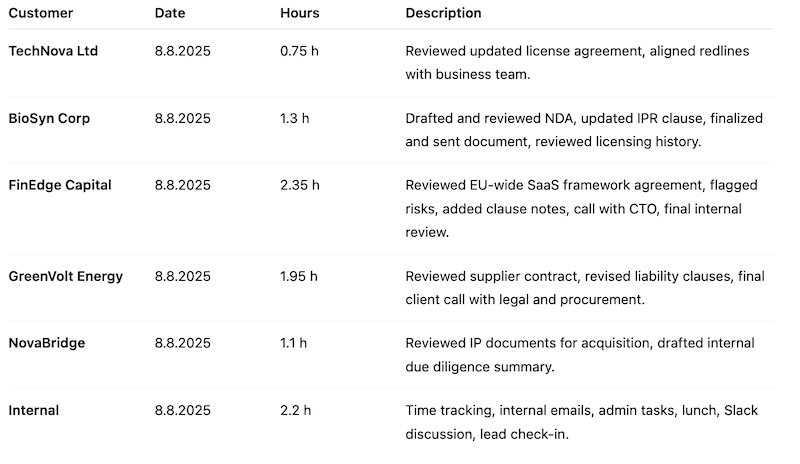Block billing in a legal industry might feel like the simplest option — and sometimes, your clients may even prefer it. But here’s the problem: if you also rely on block billing for your own time tracking, then after an 8‑ or 12‑hour workday, you don’t really know where your time went.
And as a lawyer, that’s risky. You should know exactly where your hours go — not just by the day, but down to the minute. Why? Because understanding how you spend your time is the only way to improve efficiency, ensure fair billing, and protect your bottom line.
So yes, you can still give your clients a block‑style invoice if that’s what they prefer. But behind the scenes, you should be tracking your work in detail. That way, you’ll always know how those “blocks” were really built. Lets start with a simple example comparing block billing and automated, passive time tracking report.
Block billing entry: Reviewed Customer Case, drafted a motion, phone calls on the case: 3 hours, 45min
Detailed time report:
Why this matters for you as a lawyer: Maybe you don’t want to overwhelm clients with this level of detail in invoices — it can be confusing. But if you only rely on block billing, then after an 8‑ or 12‑hour day you won’t really know where your time went. And when you’re juggling 10 cases at once, that insight is gold: it helps you optimize your workflow, delegate smartly, and ultimately invoice more fairly and effectively
Why this matters for your clients: Here’s the other side of the story: while block billing may look simple on the invoice, many clients and corporate bill review teams see it as a red flag. Without a clear breakdown, they can’t easily tell if the time spent was fair or efficient. That often leads to delayed payments, invoice disputes, or even automatic cuts of 10–25%. In short, block billing may feel easier in the moment, but it can quietly cost you both revenue and client trust.
Give your clients the choice. At the end of the day, not every client wants to read through a minute‑by‑minute breakdown of your work. Some prefer a clean, simple invoice, while others appreciate the transparency of detailed billing. The smart approach? Track everything in detail internally, then adjust the level of visibility for each client. That way, you’re always in control of your time data, while giving every client exactly the billing format they’re most comfortable with.
This example offers a more realistic view of a lawyer’s workday. While only 20–25% of lawyers track their time as they work, the vast majority (around 75–80%) reconstruct their time entries at the end of the day or even at the end of the week. When you see how fragmented a typical day really is, it’s easy to understand why so many tasks are forgotten, misremembered, or simply left un-billed.
Adeu Time Tracking Report: Corporate Lawyer
Date: 8.8.2025
Total Duration: 10 hours
Total Tasks: 21

Now, lets see how this day would look like if block billing is used:

Total Logged time: 10 hours. This shows exactly how block billing simplifies the view, but also how much valuable context disappears for both you and your client.
Creating detailed reports from billing blocks is not possible as there are no details available. If the lawyer worktime was not automatically tracked in detail, that detailed information is gone in the wind. You can always come up with creative ideas, but we all know that is not something you would like to do.
On the other hand, if you have the detailed reports down to the minute, creating billing blocks is very easy. You can even use AI (ChatGPT for that. Lets take the previous example, and make a copy/paste to ChatGPT, and ask: "Can you please create professional billing block from this detailed report. This is what I got:
Block Billing Entry (Professional Style):
Date: 8–9 August 2025
Description: Legal work on [Client/Case Name] – reviewed relevant case law, drafted motion and supporting affidavit, held client and internal team calls regarding case strategy and documentation.
Time: 3.75 hours
Billed by: [Attorney Name or Initials]
And if you think about it, is makes a lot more sense cresting a block billing record out of real details than creating a block billing record out of your memory, many times days or weeks after the work was done. Even if you do it after each workday, the studies show that 15-20% of the details are already forgotten.
Block billing isn’t illegal. It isn’t even wrong. Some clients prefer simplicity. And that, of course is fine. But if you want to grow a more profitable, efficient, and scalable legal practice, relying only on vague time summaries is like driving with your eyes half closed, or 75% closed to be more exact.
With Adeu automated time tracking working for you in the background, you don’t have to choose between simplicity and accuracy. You can track every task, every minute, without manual effort. You can still present invoices however your clients prefer. Most importantly, you gain full visibility into your own workflow. And that’s where real optimization begins.
Q1: Is block billing unethical or prohibited?
No! Block billing is still accepted in many legal practices. However, it can violate client guidelines or raise red flags in audits, especially if used excessively or without justification. Your customer decides.
Q2: Do clients actually care about billing detail?
There is not one right answer to this. Some do, some don’t. But detailed internal time tracking gives you the flexibility to provide either. And it helps prevent unbilled time.
Q3: What’s the biggest risk of block billing?
Lost revenue. When you recreate tasks after the fact, especially from memory, you’re likely to underreport or forget time. Inconsistent invoices can also harm your client trust.
Q4: Should I itemize every minute in client invoices?
Not necessarily. Use detailed time tracking for yourself, then let clients choose their preferred level of visibility. That’s the most efficient and client-friendly balance. Even if you track your time automatically in our own laptop locally, it does not mean you have to show the reports to anyone. You edit the reports first, and then you report internally or externally.
Q5: How does Adeu help with this?
Adeu automatically tracks your work in the background — by client, by case, by minute. You get the full breakdown, ready to export in block or detailed format. No manual logs, no lost time, no confusion. And again: You can freely edit the reports before sending to anyone.